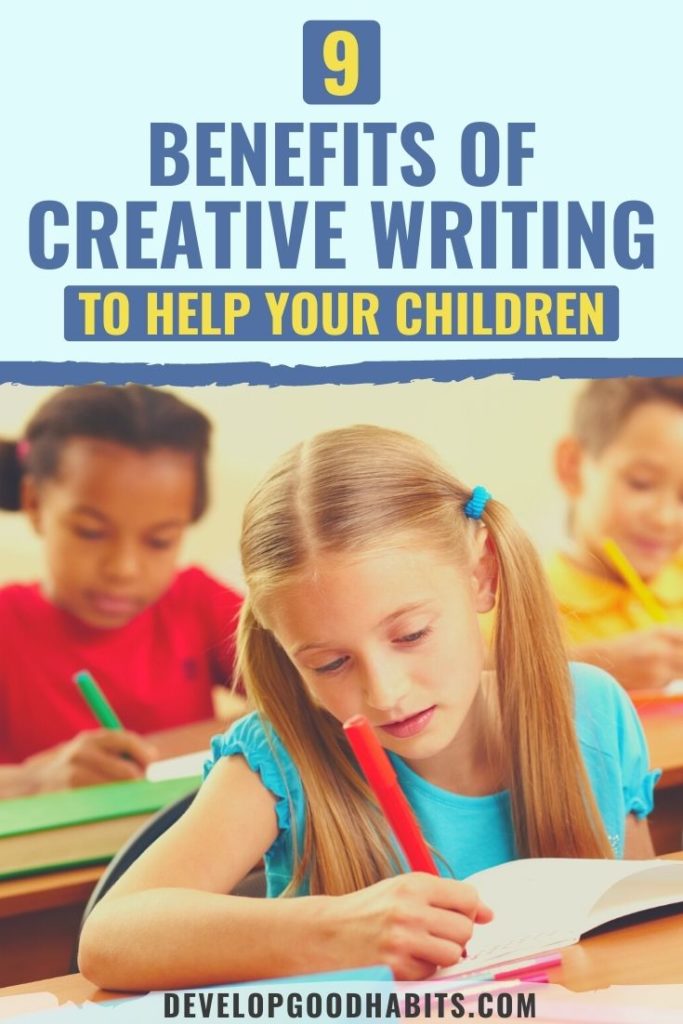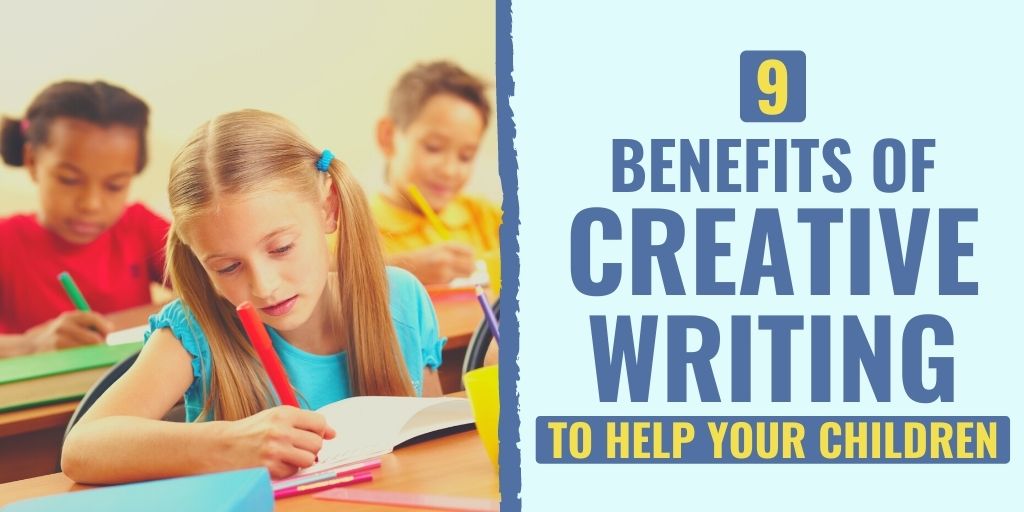There might be affiliate links on this page, which means we get a small commission of anything you buy. As an Amazon Associate we earn from qualifying purchases. Please do your own research before making any online purchase.
There they go again! Your children run through the house, mimicking characters right out of the latest Disney movie. You sense some special energy is attached to their activity, but you don’t know how to turn it into gold.
Lucky for you, we’ve got the answer… writing!
This article will demonstrate how the benefits of creative writing will change your children’s lives, enhance their thought processes and improve their school grades. The countless ways creative writing will help your kids are simply amazing if you just invest the time in learning how to tap into it.
What is Creative Writing?
Creative writing is a free-form style of writing based on the author's imagination, thoughts, and feelings. The style may be prose, poetry, playwriting, screenwriting, songs, essays, or several others. Creative writing is original and expressive of the author’s self.
While there are many types of creative writing options for adults, there are a few that children, especially, can excel in as they learn and grow. The depth and complexity should correlate to the child’s age, ability, and preference.
Types of Creative Writing for Children
How to Develop Good Creative Writing Habits
Routine and Practice
To develop and grow any good habit, you must plan a routine, work it into a regular schedule, and practice daily. Your children also need to learn this skill. It will carry over into all aspects of their lives as they learn and grow. When they mature, routines, schedules, and practicing will structure their personal lives and professional careers, making them the envy of all.
Reading
Reading and writing go together like two peas in a pod or like Mickey and Minnie or Shakespeare and Marlowe. You get the idea. Reading books serves as an example of how stories flow and communicate, but they also help develop good creative writing skills. The more a child reads, the better their writing will become, and their reading and comprehension will improve.
Nutrition
You probably didn’t expect nutrition to come into play with creative writing, but alas, it has. Healthy food helps a child’s brain function at the top of its game. Without it, a child will feel sluggish and unmotivated. Make sure your child has the healthy fuel they need to perform like a rock star.
Other ideas
Additional ideas to spark your child’s creative writing engine:
Every child is a creative writer. They may only know how to write in their heads, but they have the gift. This list of nine benefits of creative writing to help your children will demonstrate how the benefits develop and improve your children's lives. The objective is to help you understand how to help your children make the most of this wonderful asset and grow it into something lifelong and marvelous.
9 Benefits of Creative Writing to Help Your Children
1. Language Development and Linguistic Competence
Creative writing strengthens language arts skills and improves children’s grades in all areas of coursework. It helps them understand and develop good grammar habits, sentence structure, vocabulary, and dialogue.
Linguistically, children learn to communicate and comprehend language, dialects, and idioms. They may not even realize what they are doing, but the result of learning complex communication tools will be evident in their writing, reading, speaking, and interactions. These tools will help children not only in their school performance but also in their creative development.
2. Enhancement of Imagination and Creativity
Children have excellent imaginations and creativity, but they often don’t know how to harness it and develop it to get the most from it. Creative writing provides the vehicle and the fuel to let their creativity and imagination soar. It will also help your children learn language, organization, structure, form, and voice to help them in all areas of their lives.

Our childlike addiction to imagination wanes into the past as we grow older. The harsh day-to-day realities of our lives dominate our thinking, and our vision diminishes. With creative writing, it won’t fade. In fact, it becomes honed and perfected like a skilled blacksmith shoes a horse. If your children learn early how to make creative writing part of their lives, it will never leave them, even as they gallop off into the sunset.
3. Emotional Intelligence and Empathy Development
Creative writing enhances a child’s emotional intelligence and empathy development through practice and experimentation in writing. Not only will a child channel their thoughts and emotions into their writing, but they will also connect emotionally and empathically with their characters. This skill will be an enormous help to a child throughout their school years, personal life, college, and future career challenges.
4. Self-Confidence Builder
One of the primary benefits of creative writing for children is boosting self-confidence. Every time they practice, they improve. As they improve, they develop positive self-confidence. If they continue to practice creative writing throughout their school years, their writing skills will be spectacular by the time they prepare for college.
Creative writing provides a safe, supportive environment for a child to express their thoughts and feelings. As the child experiments with writing, they will eventually discover their voice and tone. The exuberant reward for this discovery is a strong and positive self-confidence.
5. Problem-Solving and Research Skills Development
Although creative writing is the self-expression of thoughts and ideas, it requires a narrative and structure. You need to know what you are talking about, which means you will need to do some problem-solving and research to make your creative writing authoritative and meaningful.
For children, this is one of the best ways to hone these skills. These children will be incredible thought leaders. As they develop creative writing routines and habits, they will excel in all areas of their life where they need to do problem-solving and research.
When a child writes creatively, their imagination sparks neurons in their brain to figure out narratives, plots, subplots, solutions, and character backgrounds and development, identity, and motives. Tackling these problems boosts brain activity, development, and growth. Story analysis and research skills will follow as the child yearns to learn more about making their stories better.
6. Therapeutic and Healing Benefits
Creative writing serves as a therapeutic treatment for those battling diseases, difficult emotions, or mental health issues. Scientific studies show that creative writing also helps physical healing through an increased antibody response in the body.
Creative writing helps children effectively and therapeutically process difficult emotions, stress, trauma, fear, and anxiety. A survey by the National Literacy Trust in the UK found that children who engage in literacy are “three times more likely to have higher levels of mental wellbeing” than those who don’t, by a margin of 39.4% to 11.8%.
As far as physical health, creative writing is associated with an increase in CD4+ lymphocyte counts, which are vital to immune system functions. This means that creative writing aids in chronic pain management, reduction in mood swings that produce an imbalance in brain chemical release, and hormonal processes. Yes. Creative writing indeed provides healing benefits for the physical body.
7. Self-Expression Builder
Self-expression is the foundational element of creative writing and helps children funnel their feelings, emotions, thoughts, ideas, and opinions into a written form that validates their identity. Self-expression is vital for good mental health and development. It teaches children how to release their thoughts in a positive, creative way that matters.

Creative writing allows a child to express themselves without judgment. This provides for the exploration and discovery of their unique identity, which is key to self-confidence and success.
8. Communication Builder
Because creative writing teaches children how to organize thoughts and structure them for presentation in writing, it also improves their overall communication skills. While they may not be writing it down in their heads, they remember the habits they learned from creative writing. It will even help them be better persuasive communicators because of their creative writing skills.
Being adults, we all understand that communication is the foundation of any relationship, personal, social, or work-related. When communication is cloudy or confusing, our relationships suffer. When our communication is clear, we thrive. Effective communication is one of the benefits of creative writing that your children will reap from learning how to do it well.
9. Interpersonal Connection Builder
One of the least considered benefits of creative writing for children is that it enhances their peer relationships. Creative writing serves as an interpersonal connection builder because it opens endless avenues for increasing social interaction, discussion, exchange of ideas, cultural learning, empathy, and trust.
As a child advances in creative writing, language skills, vocabulary, and communication skills, their interpersonal relationships vastly improve. Everyone loves a clear communicator and one who can persuade others on various topics. It’s kind of like how kids choose the best ballplayer to be on their team. They want the best. To be the best, you need practice and resources.
Resources for Creative Writing for Children
The benefits of creative writing to help your children far outweigh any burden or investment you need to make to see it through. Children who learn to write creatively and practice often rise to the top of their class in all areas. Children who suffer from trauma, illness, or mental health complexes have not only stopped the progression of their problems but also have reversed adverse effects.
The lifelong good habits your children develop from creative writing will follow them for the remainder of their lives. Creative writing is one of the best gifts you will ever give them. You never know how far your child might rise with their creative writing skills.
Final Thoughts on Benefits of Creative Writing to Help Your Children
With words, humankind has started wars and signed peace treaties. We have issued manifestos, signed pardons, written laws, and authored works that have changed the world, for worse and for good.
Your child may just be the one who brings peace to the planet and comforts the brokenhearted. Teaching children creative writing skills is the secret to opening doors of opportunity for the entire world.
Please visit our site at Develop Good Habits. Also, check out 13 Growth Mindset Videos for Kids to Watch on YouTube. Your children hold the keys to the future for us all.

Rain Story is an author and screenwriter. She is an alumna of the University of Arkansas at Little Rock, the University of New Mexico, and the University of Kentucky. She earned two B.A.s and four years of graduate studies in literature, languages, and creative writing before personal tragedies pulled her away from her graduate work. She is also a Donaghey Scholar and fellow of the William G. Cooper, Jr. Honors Program in English.


